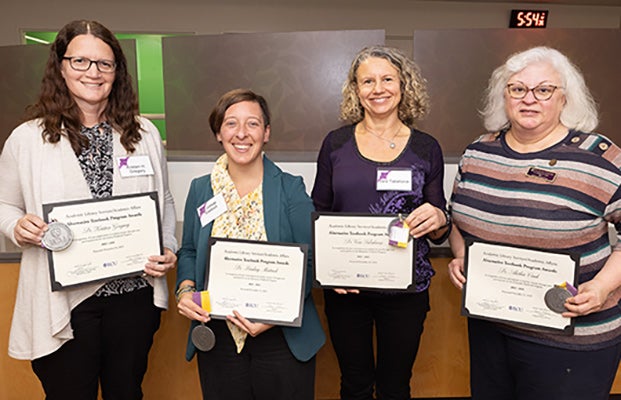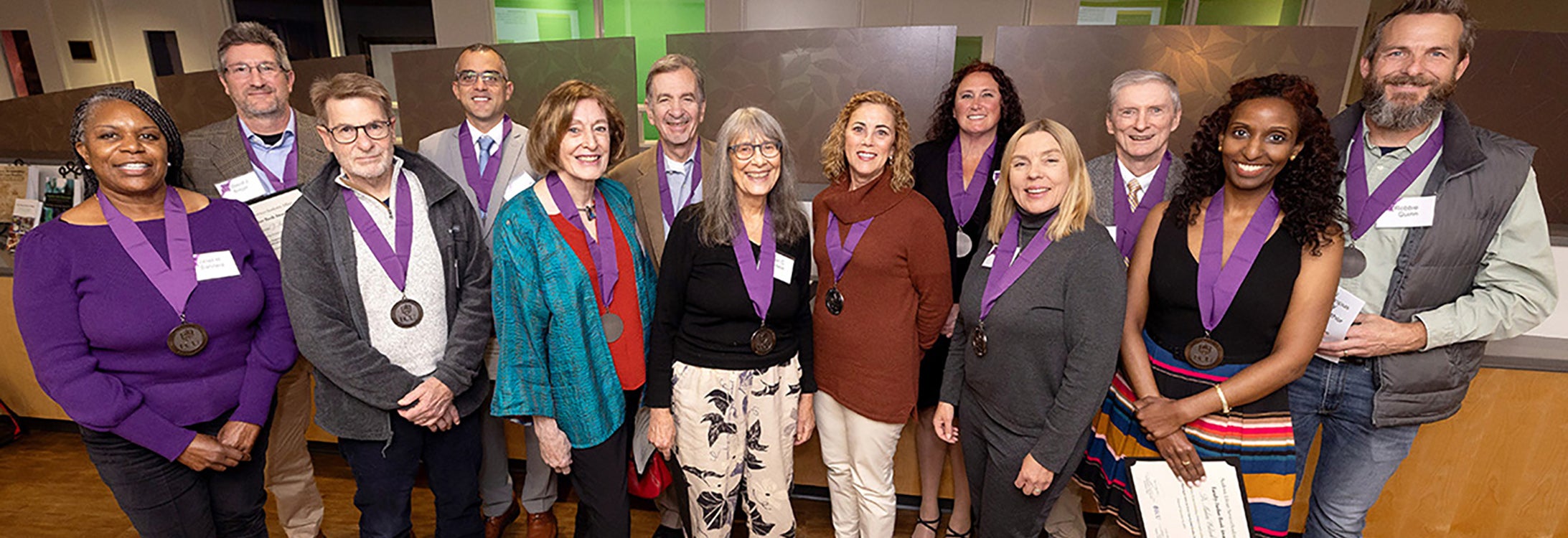Faculty honored at annual author, alternative textbook awards

Some of the faculty participating in the 2023-24 Alternative Textbook Program pose together after receiving their award. (Photos by Rhett Butler)
Book topics displayed in the Janice Hardison Faulkner Gallery included family life education, an edited autobiography, teaching challenging topics in the classroom, a Ghana newspaper, economics and Congress. There were more topics, but they also had a common strand, as emphasized by Academic Library Services director Jan Lewis at the 13th annual East Carolina University Main Campus Faculty Author Book and Alternative Textbook Awards.
“The themes that resound through ECU’s mission are reflected in your work, leadership, innovation and service,” Lewis said.
Authors represented five colleges — College of Health and Human Performance, Thomas Harriot College of Arts and Sciences, College of Fine Arts and Communication, College of Education and College of Engineering and Technology — along with Academic Library Services, the Brody School of Medicine and Department of Coastal Studies. A full list of authors and book titles published between July 1, 2022, and June 30, 2023, is featured on the library website.
Faculty participating in the 2023-24 Alternative Textbook Program save students more than $44,000 per semester. The program is co-facilitated by Jeanne Hoover, head of scholarly communication, and Allison Kaefring, publishing and open access support librarian, and includes personal librarians paired with faculty members in their transition to new course materials such as open textbooks, library subscriptions and other free materials.
“One of the components I appreciate most in the alternative textbook awards is the dedication of and collaboration with our excellent librarians,” said Anne Ticknor, chair of the ECU Faculty Senate and a professor in the College of Education. “Their skills in researching, location and organizing resources that fit with the goals of the application enable faculty to be supported in their work as instructors. I want to congratulate each of you for your award. I am honored to be one of your colleagues, and I hope you take time to pause, appreciate and linger in the recognition you have received.”
Lewis, Ticknor and Provost Robin Coger all provided remarks during the ceremony. The awardees were individually recognized.

Authors gather after the 13th annual ECU Main Campus Faculty Author Book and Alternative Textbook Awards.
One of the more unique monographs highlighted was the storybook “Zulu & Zot” by teaching assistant professor Sue Luddeke in the School of Art and Design. Luddeke is writer and illustrator for the rhyming book, described as suitable for ages 12 and up and reminiscent of Dr. Seuss mixed with “Alice in Wonderland” and “The Hobbit.”
Luddeke said it has many layers.
“It’s very abstract, and the rhyming is fun,” she said. “It’s not specific, and I did that on purpose. Anybody could take this and incorporate it into their paradigm and share it. … It can be fun and it depends on how you read it to kids of how accessible it is. The audience is all ages, because I think adults need children-style books for them. There are a lot of pictures with fun ideas and a little bit of silliness.”
Other book examples included “Recreational Barking: Autobiography of Artist Tom Martin” by William J. Meggs and Susan Martin Meggs, and “Planning for Cities in Crisis: Lessons from Gondar, Ethiopia” by professor emeritus Mulatu Wubneh.
All authors, editors and librarians received praise for their dedication.
“Getting a book from a blank page to a scholarly product certainly requires a lot of hard work,” Coger said. “I applaud all of our authors for their work and fantastic job. To our alternative textbook awardees, thank you for the work you do in thinking about ways to be cost-effective for our students, but also making sure that the content you may not be able to find is in your books. It is really about student success and how it helps our students learn.”